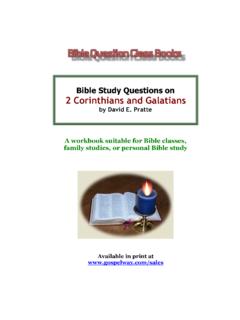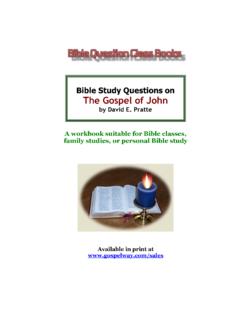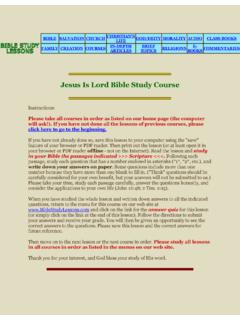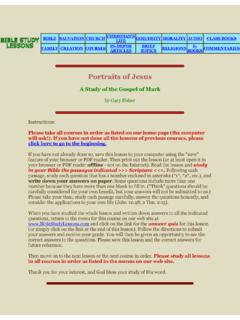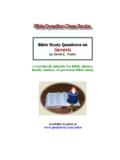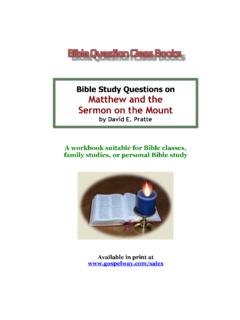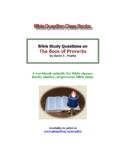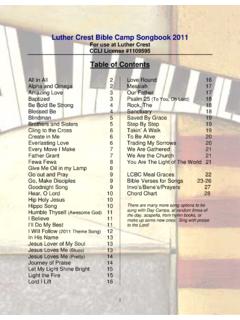Transcription of Portraits of Jesus - Bible Study Lessons
1 Bible SALVATION CHURCH CHRISTIAN'S LIFE GOD/DEITY MORALITY AUDIO CLASS BOOKS FAMILY CREATION COURSES IN-DEPTH ARTICLES BRIEF TOPICS RELIGIONS E-BOOKS COMMENTARIES Portraits of Jesus A Study of the Gospel of Mark by Gary Fisher Instructions: Please take all courses in order as listed on our home page (the computer will ask!). If you have not done all the Lessons of previous courses, please click here to go to the beginning. If you have not already done so, save this lesson to your computer using the "save" feature of your browser or PDF reader. Then print out the lesson (or at least open it in your browser or PDF reader offline - not on the Internet). Read the lesson and Study in your Bible the passages indicated >>> Scripture <<<. Following each passage, Study each question that has a number enclosed in asterisks (*1*, *2*, etc.)
2 , and write down your answers on paper. Some questions include more than one number because they have more than one blank to fill in. ("Think" questions should be carefully considered for your own benefit, but your answers will not be submitted to us.) Please take your time, Study each passage carefully, answer the questions honestly, and consider the applications to your own life (John 12:48; 2 Tim. 2:15). When you have studied the whole lesson and written down answers to all the indicated questions, return to the menu for this course on our web site at and click on the link for the answer quiz for this lesson (or simply click on the link at the end of this lesson). Follow the directions to submit your answers and receive your grade. You will then be given an opportunity to see the correct answers to the questions.
3 Please save this lesson and the correct answers for future reference. Then move on to the next lesson or the next course in order. Please Study all Lessons in all courses in order as listed in the menus on our web site. Thank you for your interest, and God bless your Study of His word. Jesus Teaches in Parables Lesson 3 Parable of the Sower >>> Read Mark 4:1-20. <<< Please read this story in your Bible before studying the lesson. Jesus frequently taught in parables. A parable is a story with a spiritual application. Here, Jesus described a farmer who went out to sow seed in his field. Naturally, as he went along scattering it with his hand, the seed fell onto different types of ground. The harvest depended on the kind of soil where the seed fell.
4 The disciples did not understand what Jesus meant, so they asked Him to explain. Jesus described four types of people who hear the word of the gospel. The first type is like hard-packed soil. These hard-hearted people do not let the word penetrate into their life; they reject it immediately because they have closed their mind. The second type is like seed sown in rocky places. The idea here is of a thin layer of topsoil covering a large rock. When seed is sown in such a place, it will germinate and grow in the shallow soil, but it will not develop deep roots. When the sun comes out and it doesn't rain for a few days, the plant will wither and die. This represents a person who eagerly receives the word, but doesn't develop roots through faith and Bible Study .
5 This person will not have the ability to withstand the temptations and persecutions that come along in life. Third, Jesus described the thorny soil. In this ground, the plant is overshadowed by taller weeds which suffocate fruit production. This soil symbolizes people who receive the word and although they allow it to continue in their lives, permit competing interests to dwarf it. These other influences may not be bad things in themselves, but they dominate the person's life so much that the seed can't bear fruit. Finally, Jesus described good soil in which plants bear abundant fruit. This soil represents Christians who are diligent in the service of God. Note -- Which soil are you? Everyone has a place in the parable of the sower. Jesus wants us to evaluate which type of soil we are.
6 1) Hopefully, we won't be the hardened, wayside soil. If we are, we will close our mind to the truth and refuse to allow the gospel to penetrate our heart and change our life. 2) Perhaps we'll be the rocky soil. On the surface we appear to be growing and serving the Lord enthusiastically. But we aren't deepening our roots through faith, through Study and through a deeper personal relationship with Jesus Christ. When times become tough, we will fall away and others will marvel, because on the surface it looked like we were doing so well. 3) If we end up being the thorny soil, we will continue to "be a Christian," but our life will be dominated by other activities and we will never have much time or attention to share with spiritual concerns. This is probably the most subtle danger, because the plant in thorny soil never completely falls away.
7 As a result, we can soothe our conscience and believe that we are still doing OK, when in fact, we aren't bearing fruit. 4) Ideally, we will be the good soil that bears the fruit of righteousness for the Lord. Note -- Meditations on the seed: Jesus explained that the seed represents the word of God (Luke 8:11). There are many Lessons that can be learned by the analogy between seed and the word. For example, seed always produces after its kind. That is, rice seed always produces rice plants, corn seed produces corn plants, and pumpkin seed pumpkin plants. There are no exceptions. By the plant that results, one can determine what seed was planted. So it is in the spiritual realm. When the pure word of God is planted, the resulting plants are Christians.
8 When you end up with other things--say Buddhists, Mormons, or Jehovah's Witnesses, you know that something besides the word of God was planted. To produce a Buddhist, you must plant the teachings of Buddha. To get a Mormon, the book of Mormon and the teachings of the Mormon church must be planted. Jehovah's Witnesses are formed by planting the teachings of their organizational headquarters, the Watchtower Society. What would happen if you merely planted the Scriptures, without mixing in any other teachings? Seed never changes. It would be theoretically possible to eliminate pumpkin plants from the face of the earth. Yet if pumpkin seeds were preserved, someone many years later could plant them, and again produce pumpkins. So also in Christ. The seed is the word of God (1 Peter 1:23-25).
9 Even if there had not been servants of Christ on the earth for a long time, when people returned to following the Bible only, they would become Christians. Our goal should be to reproduce pure disciples of Christ in the twentieth century, just like they were in the first. *1* What is a parable? Answer: A parable is a physical story with a _____ application. *2* What kind of soil did Jesus describe? (a) wayside soil, (b) stony soil, (c) thorny soil, (d) good soil, (e) all of these. Answer: _____. *3* What does the seed represent? Answer: It represents the _____ of God. *4* What does the wayside soil represent? Answer: It represents people whose hearts are hardened, so that Satan takes the _____ from their hearts. *5* The rocky soil represents people who do well for a while, but then fall away because of what?
10 A) hardened hearts, b) tribulation or persecution, c) too much Bible Study , d) all the preceding. Answer _____. *6* Is it possible for a person who has received the word to fall away (see also Galatians 5:4)? (yes or no) Answer: _____. *7* In the thorny soil, the thorns represent what? a) hardened hearts, b) false doctrines, c) cares of the world and deceit of riches, d) all the preceding. Answer: _____. *8* What was the principal characteristic of the good soil (v20)? Answer: It bore _____, some thirtyfold, some sixty, and some a hundred. *9* How does seed reproduce (see also Galatians 6:7)? Answer: Whatever a man sows, that is what he will _____. *10* What causes people to become members of various different religious groups? Answer: They hear and accept the _____ taught by those groups.

